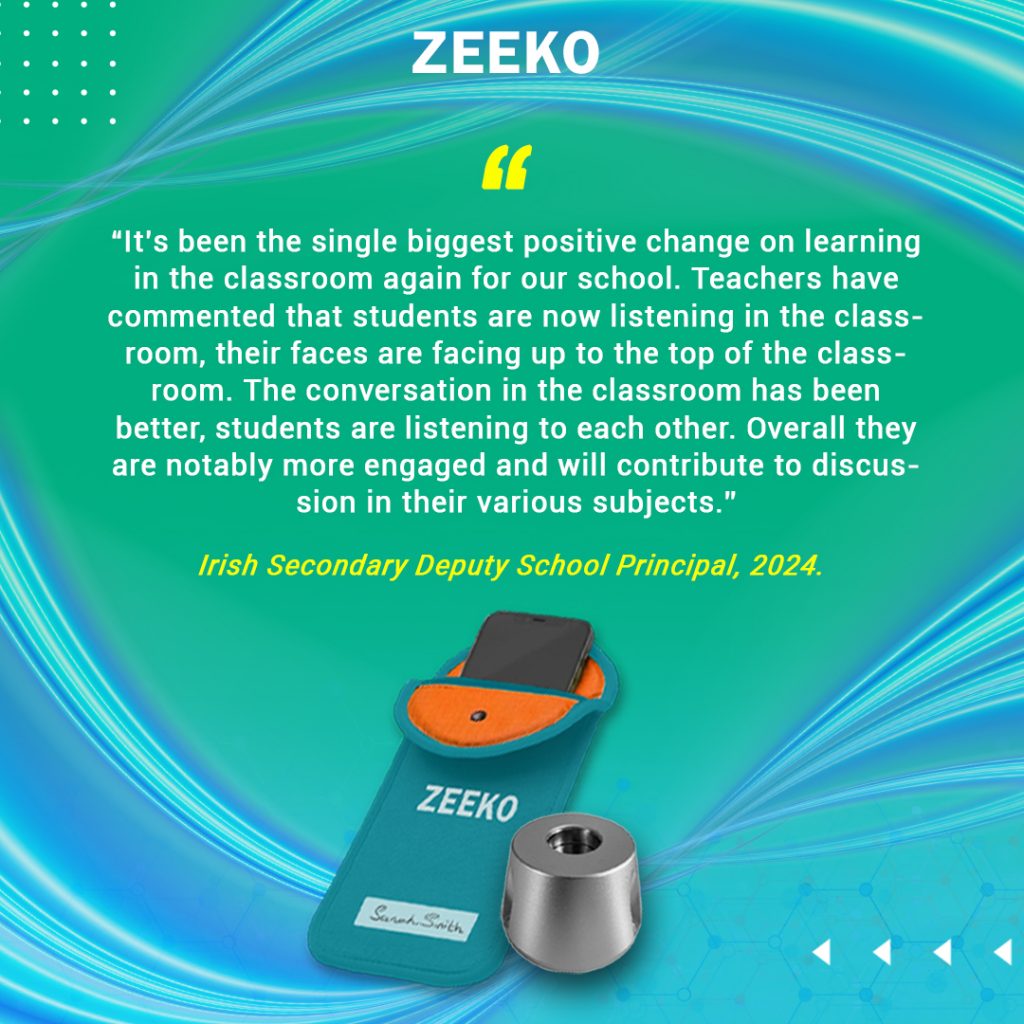
- Reduced Academic Performance: Students who use smartphones frequently during school hours tend to score lower on tests and assignments.
- Decreased Social Interaction: Smartphones can isolate students, discouraging face-to-face communication and teamwork.
- Challenges to Classroom Management: Teachers often struggle to maintain control and keep students engaged when phones are present.
- Mental Health Concerns: Excessive phone use has been linked to increased anxiety, stress, and disrupted sleep patterns in students.
- Improved Attention in Class: When phones are out of sight, students are more likely to focus on lessons, participate in discussions, and engage with classroom activities.
- Less Multitasking: Multitasking with a smartphone reduces productivity and comprehension. By removing phones, students can concentrate on one task at a time.
- Minimised Peer Distractions: It’s not just the owner of the phone who gets distracted; students sitting nearby can also lose focus when someone uses a phone in class.
- Higher Test Scores: Schools that have implemented phone pouches report noticeable improvements in test scores. With phones out of reach, students spend more time studying and less time on non-educational activities.
- Enhanced Memory Retention: Learning requires focus, and the absence of phone interruptions allows students to process and retain information more effectively.
- Better Homework Habits: When phone use is controlled during school hours, students are more likely to carry those disciplined habits into their homework routines.
- Encouraging Social Interaction: Without phones, students are more likely to interact with their peers, building stronger friendships and teamwork skills. Lunchtimes and breaks become opportunities for real conversations rather than silent scrolling.
- Empowering Teachers: Teachers no longer have to compete with smartphones for attention, allowing them to focus on delivering lessons and have meaningful interactions with students.
- Promoting Mindfulness: A phone-free environment encourages students to be present in the moment, whether they’re listening to their teacher, collaborating on a project, or simply enjoying a quiet moment of reflection.

- Fewer Disciplinary Issues: With phones locked away, teachers spend less time addressing disruptions and more time teaching.
- Streamlined Policies: A universal phone policy, enforced through pouches, eliminates ambiguity and ensures fairness.
- Increased Respect for Rules: The consistent use of phone pouches reinforces the importance of boundaries and mutual respect in the classroom.
- Reducing Social Media Pressure: A break from social media during the day can alleviate the pressure to constantly check notifications, likes, and messages.
- Encouraging Face-to-Face Communication: Real-world interactions are essential for emotional well-being and social development.
- Promoting Better Sleep: Reduced phone use during the day can help students establish healthier screen time habits, leading to improved sleep quality.
- Set Clear Goals or your ‘Why’: Define what you hope to achieve, such as improved focus, higher test scores, or fewer disciplinary issues.
- Communicate with Stakeholders: Involve teachers, students, and parents in the discussion to address concerns and build support.
- Choose the Right System: Select a locking pouch solution that suits your school’s needs and budget.
- Train Staff and Students: Provide guidance on how to use the pouches effectively and explain the benefits.
- Monitor and Adjust: Evaluate the impact of the pouches regularly and make adjustments as needed.
Frequently Asked Questions (FAQs)
What are Zeeko Phone Pouches?
Zeeko Phone Pouches are part of the Zeeko Phone Blocking System, designed to securely store students’ smartphones during the school day. Once locked, phones remain inaccessible until unlocked at designated times or locations, helping to minimise distractions and support focused learning.
Why are smartphones a problem in secondary schools?
Smartphones can significantly divide student attention, leading to reduced academic performance, increased classroom disruptions, and social isolation. Many schools also report heightened anxiety and FOMO among students caused by constant notifications and social media access.
How do Zeeko Phone Pouches improve student focus?
By removing phones from immediate access, Zeeko Phone Pouches eliminate notifications, messaging, and social media distractions. This allows students to fully engage in lessons, participate in discussions, and focus on one task at a time.
Do Zeeko Phone Pouches help improve academic performance?
Yes. Schools that implement Zeeko Phone Pouches often report better concentration, improved memory retention, and higher test scores. With fewer distractions, students can absorb information more effectively and develop stronger study habits.
How do phone pouches create a more engaged school culture?
A phone-free environment encourages face-to-face interaction, teamwork, and real conversation. Schools using Zeeko Phone Pouches frequently notice livelier corridors, stronger friendships, and improved social connections among students.
Can Zeeko Phone Pouches support teachers with classroom management?
Absolutely. Zeeko Phone Pouches reduce the need for constant phone policing, allowing teachers to focus on teaching rather than enforcement. This leads to fewer disciplinary issues, clearer expectations, and more consistent rule-setting across the school.
How do Zeeko Phone Pouches support student wellbeing?
Limiting phone access during school hours helps reduce social media pressure, anxiety, and stress. Students benefit from more real-world interaction, improved mindfulness, and healthier screen-time habits that can positively affect sleep and mental health.
Are Zeeko Phone Pouches fair for all students?
Yes. Using Zeeko Phone Pouches ensures a level playing field—no student has access to their phone while others do not. This consistency reduces peer pressure and helps reinforce fairness and shared responsibility.
How are Zeeko Phone Pouches used during the school day?
Students place their phones into the pouch at the start of the day, where they remain locked. Phones are unlocked only at approved times or locations, such as after school or in designated areas, depending on school policy.
What steps should schools take to implement Zeeko Phone Pouches?
Successful implementation involves setting clear goals, communicating with parents and students, training staff, and regularly reviewing outcomes. Zeeko supports schools through each step to ensure a smooth and effective rollout.
Are parents and students involved in the decision-making process?
Yes. Open communication with parents, teachers, and students is encouraged to explain the benefits, expectations, and procedures. This helps build trust and long-term support for the initiative.
Can Zeeko Phone Pouches help reduce online incidents in schools?
Yes. Schools report fewer incidents being recorded or shared online during the day, giving staff time to manage situations calmly and professionally without external interference from social media.
Is Zeeko currently supplying Phone Pouches to Irish schools?
Yes. Zeeko Education is now taking orders and providing Zeeko Phone Pouches to Irish secondary schools. Schools interested in introducing the system can complete the enquiry form to explore the initiative further.
Explore Zeeko’s Home Page to discover our mission on the About Us Page, innovative Phone Blocking System, and engaging Phoenix Quest 10 programme. We provide Internet Safety Seminars, the Zeeko Report Card, and the Magical Leaders Choose Country initiative, alongside insights from our Digital Trend Report. Stay connected with us on Facebook and Instagram for updates.

